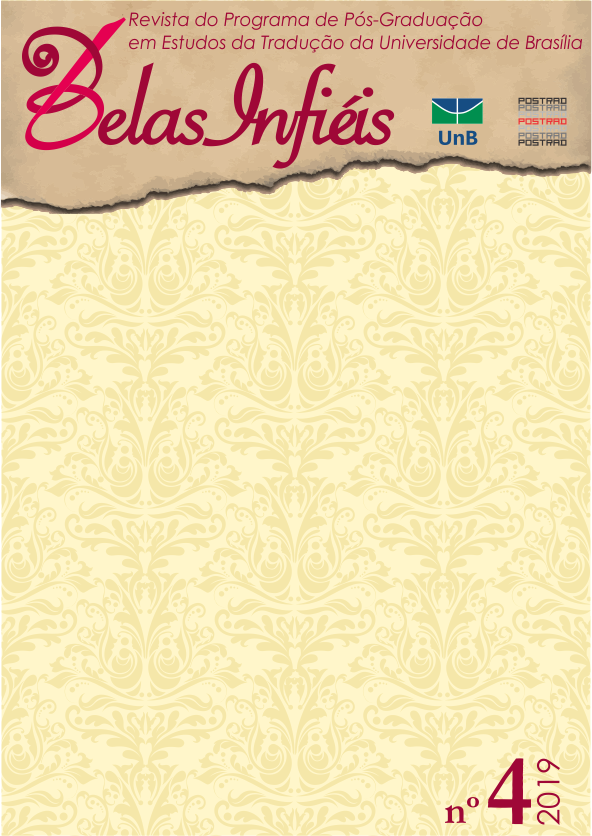Vulgarización y destrucción del habla andaluza en la traducción literaria
DOI:
https://doi.org/10.26512/belasinfieis.v8.n4.2019.22624Palabras clave:
Traducción literaria. Traducción ética. Superposiciones de lenguas. Variedad andaluza. Español-Portugués.Resumen
La traducción literaria en el par lingüístico español-portugués supone afrontar retos que van desde las cuestiones lingüísticas relacionadas con la proximidad entre ambas lenguas hasta la toma de decisiones por parte del traductor. Este artículo pretende centrarse en este último, discutiendo y poniendo de relieve la postura ética del profesional de la traducción frente al fenómeno de las superposiciones de lenguas. Para tal fin, en este trabajo se ha elegido un fragmento de La Sombra del Viento, novela escrita originalmente en español por Carlos Ruiz Zafón, con el objetivo de analizar, a la luz de los postulados de las tendencias deformantes de Berman (2014 [1999]), la actuación de dos traductores implicados en dicha labor. En concreto, se ha puesto el acento en las reflexiones de este teórico en lo que respecta al borramiento de las superposiciones de lenguas y la destrucción de las redes lingüísticas vernáculas. El análisis, de cariz contrastivo, ha centrado la atención en las soluciones ofrecidas por los traductores en portugués de Brasil y de Portugal para el problema del habla andaluza que se ha identificado en el modo de comunicarse de uno de los personajes. Los resultados no podrían haber sido un ejemplo más convincente de las múltiples posibilidades de solución en el marco de la traducción literaria. Sobre todo, se ha detectado que se impone un conjunto de peculiaridades (omisión, transformación, homogeneización, entre otras). Dicho conjunto es el que ha conducido a cada uno de los traductores involucrados a desempeñar su oficio de un modo particular. De hecho, se ha identificado una paradoja en la que cada traductor actúa de distintas formas. Todas ellas se encuentran previstas en el acervo de tendencias deformantes de Berman.
Descargas
Citas
BERMAN, Antoine. La traducción y la letra o el albergue de lo lejano. Traducido por Ignacio Rodríguez. 1. ed. Buenos Aires: Dedalus Editores, 2014. 160 p.
KOINÉ. En: Diccionario de la lengua española. 23. ed. Real Academia Española, 2014. Disponible en https://dle.rae.es/?id=Mi9J3sc. Consultado el 1 out.19.
MESCHONNIC, Henri. Poética do traduzir. Traducido por Jerusa Pires Ferreira e Suely Fenerich. São Paulo: Perspectiva, 2010. Impreso. 279 p.
RUIZ ZAFÓN, Carlos. La Sombra del Viento. Barcelona: Círculo de Lectores (por Cortesía de Editorial Planeta), 2001. Impreso. 445 p.
RUIZ ZAFÓN, Carlos. A sombra do vento. Traducido por Marcia Ribas. Rio de Janeiro: Editora Objetiva, 2007. Impreso. 399 p.
RUIZ ZAFÓN, Carlos. A sombra do vento. 23. ed. Traducido por José Teixeira de Aguilar. Lisboa: Publicações Dom Quixote, 2013. Impreso. 507 p.
Descargas
Publicado
Cómo citar
Número
Sección
Licencia
Copyright Statement
Given the public access to this journal, the texts are free to use but requires the recognition of the original authorship and initial publication in this journal to be properly stated.
The journal allows the use of works published for non-commercial purposes, including the right to submit the work to publicly accessible databases. Published contributions are the sole and exclusive responsibility of the author(s).
- When submitting papers to be evaluated by the Belas Infiéis journal, the author(s):
- Declare that the contents of the contributions are original and of their original creation, being entirely responsible for their content if there is an objection by third parties.
- Claim to be aware that they should not commit academic plagiarism.
- Declare that the manuscript has not been published, completely or partially, in Portuguese or another language. If it is a translation it should be submitted to the Translated Articles section.
- Declare that the manuscript is not being evaluated by other journals.
- Declare that the manuscript was not submitted to another journal simultaneously.
- Commit(s) to inform the journal of any kind of error or inaccuracy in their contribution (published, in evaluation or in editing) and to collaborate with the editors to make due corrections of the article (when in evaluation or editing) or erratum/retraction (after publication).
- Declare that there is no conflict of interest regarding the published work.
- Authorize its release if it is accepted for publication without any kind of monetary compensation.
- Agree to assign non-exclusive rights to publication to the magazine, remaining free to make their contribution available in other media as long as the publication of the first version in Belas Infiéis magazine is mentioned. They also authorize Belas Infiéis to assign their texts for reproduction in content indexers, virtual libraries and similar platforms.
- Maintain copyright and grant the journal the right of first publication, the work being licensed under theCreative Commons Attribution License.
- Is/Are allowed and encouraged to publish and distribute their work online after the editorial process, which may increase the impact and citation of the published work.
- Authorize the editorial team to make textual adjustments and to adapt the article to the publication rules, when necessary.



















